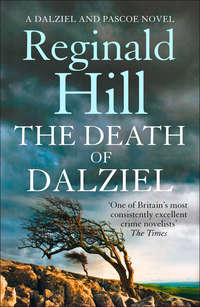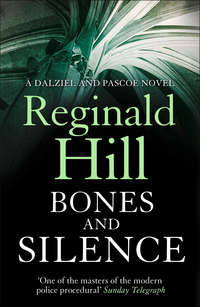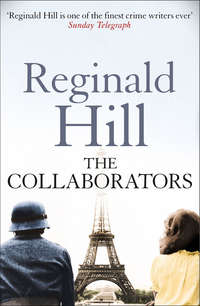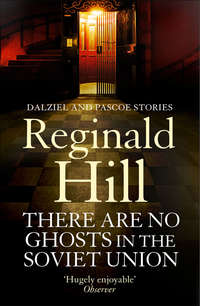
Полная версия
Born Guilty
Joe didn’t altogether believe this. But he did wonder how a God accustomed to the gentle murmurings of Hallelujah choruses might feel about this level of decibels.
Happily, he was able from long experience to detect that it was approaching its climax. This was not, great though it was, Gary’s valedictory rendition of ‘I’m the Leader of the Gang (I am)’ but the voice of a steward shouting ‘Awafokyerselyerweedickheed!’ and Hull’s respondent scream as a size eleven army surplus boot came down on his hand.
The scream peaked as Joe entered. No one was talking. Even the new generation of kids brought up in a sound environment which made the machine room Joe had worked in most of his adult life seem like a forest glade, couldn’t compete with this combination of frantic fans, stroppy stewards, and personal pain.
Then it was over. For a second there was a fragment of that rarest of things at the Glit, perfect silence.
In that moment Joe’s gaze met Galina Hacker’s across the crowded bar, and his heart sank. She’d been at the Oxfam shop again. At least the seventies flared trousersuit she wore covered those provocative legs (how could anything so skinny be so sexy?) but she’d given the tunic a bit of pazazz by cutting off the sleeves, and even from this distance Joe could see she was wearing nothing beneath it. The flesh missing off her legs had been redistributed up there with equally disturbing results.
First things first. He gestured to the bar and shouldered his way through, giving and returning greetings. Next best thing to anonymity for a PI was a place where everyone knew you, especially when it meant your pint of Guinness was already waiting, neat and welcoming as a vicar at a wedding.
‘Thanks, Eric,’ he said.
Eric, a young man whose habitually worried expression clashed strangely with the brash assertiveness of his diamanté-studded waistcoat, watched in respectful silence as Joe downed five inches, then said, ‘No Whitey?’
‘No. I’ve been rehearsing. He doesn’t care for Haydn.’
Whitey was his cat. No way you could get him into the chapel. Rev. Pot reckoned he’d got enough on his plate dealing with human crap. But St Monkey’s larger spaces had tempted Joe to bed Whitey down on a hassock in a remote pew at the first united rehearsal. He’d been all right through the introductory Chaos and the piano entry of the choir. But when they reached let there be light, and there was LIGHT, and the voices and instruments exploded in that most glorious of musical exultations, Whitey had shot upright and started a howling which had persisted long after the music had died away.
Most people had been amused. Aunt Mirabelle was not most people. According to her, Joe had let down himself, his family, Boyling Corner Chapel, and every decent Christian soul who’d ever had the misfortune to come in contact with him.
Memory of Mirabelle was so strong that when a hand grasped his arm he jumped guiltily and almost spilt some stout.
‘Thought you wasn’t coming,’ said Galina accusingly.
He turned and looked at her. Despite apparently being assaulted by a mad sheep-shearer and a myopic action painter, she was still a beautiful girl. But why not? Blacked out teeth and a raggedy suit hadn’t stopped Judy Garland of immortal memory from being the loveliest swell walking down the avenue.
‘Hello, Gal,’ he said. ‘Got a drink?’
For answer she held up a bottle. Joe winced. It wasn’t just the contents, winceable though they were, being something called Luger which the ads claimed ‘blows you away’. It was the way these young girls drank straight from the bottle that offended something deep down. When he’d mentioned this to his friend, Merv Golightly, his distaste had been submitted to a long and deeply unflattering sexual analysis. But so were most things that tugged at Merv’s consciousness, from Luton’s performance in the FA Cup to the way that John Major walked. As a taxi driver, Merv was used to a captive audience. An American visitor had once hired him to drive her to Leeds and back twice a week for a month. ‘It’s cheaper than my analyst,’ she said. ‘And it does me more good.’
‘Let’s sit down,’ said Galina.
She led him to a table where a bunch of her mates were protecting a couple of empty chairs by smashing their bottles down on any hand foolish enough to grasp them. They greeted Joe with their customary silent incredulity that one of his advanced years could still be moving with no apparent mechanical aid, then went back to their conversation which consisted of an interchange of staccato screams. The only alternative was to lean forward so that your lips were almost touching your interlocutor’s ear. This was the mode preferred by Joe and Galina, and if Aunt Mirabelle could have seen them in this position, the worst case scenarios hypothesized by her spies would have been positively confirmed.
A tape of the conversation would have been more puzzling.
‘You got anywhere yet?’ said Galina.
‘Give me time,’ said Joe.
‘It’s been a week.’
‘Six days,’ said Joe firmly. ‘I said it would need to be slow else you could end up getting what you’re trying to avoid.’
‘Yeah? Maybe publicity’s what we need, get it out in the open, make them show their hand.’
‘We’ve been through all this,’ said Joe gently. ‘If they’ve nothing to show, all you’re doing is giving the loonies a feast. There’s no such thing as good publicity. You see a headline saying: BISHOP NOT BONKING CURATE’S WIFE, it doesn’t stop rumours, it starts them. Get a hint of this in the papers, makes no matter how innocent they say your granddad is, there are enough loonies out there to give him and you and the whole family a really lousy time. Is that what you want?’
‘Of course it’s not,’ said the girl. ‘Only I hoped …’
Her voice tailed off, though he could still feel her breath warm on his ear lobe. He knew what she hoped. That in bringing her worries to him, she’d be told in no time flat that she had nothing to worry about. That’s what people often wanted, and they had a nasty habit of blaming him when he couldn’t give it to them.
She said, ‘He’s been round at the club again, asking questions. I got a proper description this time.’
She took a piece of paper from an inner pocket. It was warm from her breast. On it she’d scribbled: 5’8"–5’10" (bigger than me but not too much) reddish hair. Blue eyes. Swollen nose. Big feet. Olive-green jacket.
Joe said, ‘This sound the same as the one who got talking to your mum?’
‘Yeah, except she didn’t say anything about his nose. Maybe someone’s hit him since then. Gets in my range, it’ll be more than a swollen nose he ends up with!’
Joe regarded her gravely and said, ‘You’re not stupid enough to do that, are you, Gal?’
In fact, he knew she wasn’t stupid at all. And the more he talked to her, the brighter she seemed. He’d known her for a long time without really knowing her. She was a cashier at the Luton and Biggleswade Building Society where Joe stashed what little money he managed to save from his erratic income. She was pleasant and personable and always greeted him by name and passed the time of day as she updated his book.
He’d never seen her outside the building society except for one night he’d been invited to the Uke, the local Ukrainian Club, by a client and he’d spotted her sitting with a middle-aged couple and an older white-haired man. She’d given him a wave and he’d gone over and been introduced to her parents, George and Galina Hacker, and her grandfather, Taras Kovalko. Joe’s client had filled him in later. Taras was one of the numerous displaced persons who found refuge in the UK after the war. He’d settled in Manchester, married an English girl, had one daughter he called Galina after his own mother. She had married George Hacker, a salesman, and they’d gone to live in Luton. Widowed and retired, Taras had come to live with them a couple of years ago.
Joe, who’d hitherto guessed that the girl’s unusual name was merely one of those Anglo-Saxon flights of fancy which filled the classified ‘Births’ with Clints and Garths and Meryls and Kylies, was pleased to know it had a real meaning. He believed in families. Blood was thicker than water, though he wasn’t so sure about Guinness.
Then about a week ago, when he visited the building society to draw out a little of the little that was left, the girl had asked in a low voice if she could see him professionally.
‘Sure,’ he said. ‘When?’
‘It’s my half day today,’ she said.
‘Fine,’ said Joe, smiling at her. In her M & S cardie with minimal make up and straight brushed hair, she looked about fourteen. He didn’t fancy making her walk down the rather seedy street which housed his rather scruffy office, so he said, ‘How about four o’clock in the Sugar ’n’ Tongs?’
The Sugar ’n’ Tongs was the kind of place people took their grannies, very safe, very central.
‘OK,’ she said.
He’d got there early so she wouldn’t feel uncomfortable arriving by herself. He realized he stuck out like a sore thumb among the mainly formidable female clientele. But he’d been united with them in conversation-stopping surprise when a spiky-topped alien in a skirt like a guardrail above a dizzying drop, and a halter straining like a tops’l in a Force Ten gale, had come through the door. The unity had been shortlived. From being a spectator he became part of the spectacle as the newcomer headed straight for his table and from that vermilion mouth came the words, ‘Hello, Mr Sixsmith. Good of you to see me.’
Though the noise level here was decibels below the Glit, they set the pattern for future conversations by leaning close together to thwart the straining ears.
What was said would probably have disappointed the would-be eavesdroppers, but Joe it deeply dismayed.
‘I was down at the Uke last week helping with the refreshments. It was a ladies’ social night, Mum’s really keen, it was her actually that got Grandda started going, he’s never been a one for living in the past, but since he joined he’s been really enjoying it. And I got talking to Mrs Vansovich, you may remember seeing her, little old lady, about the size of a garden gnome and she looks a bit like one too. The men make a joke about her, Vansovich always a witch, very funny ha ha, but she is a bit of a gossip, no denying. She started telling me about this man who’d been asking questions, said he was trying to contact someone called Taras something beginning with a K. He said his grandmother had got to know this Taras after the war when she was a driver for some colonel in charge of dealing with displaced persons in southern Germany. He said his grandmother was bedridden now and would like to see this Taras again, but she couldn’t remember his second name except that it began with a K, and she thought he came from Vinnitsa which is where Grandda was born, and Mrs Vansovich knows this because she was born there too and is always wanting to talk about it.’
Tea arrived and she paused for breath. When the waitress had gone, Joe said, ‘Galina …’
‘Gal. My friends call me Gal. Or Gallie.’
Joe, conscious of the presence of some of the sharpest observers in Luton, didn’t think this was a good time to offer her the familiarity of calling him Joe.
He said, ‘Gallie, if you could get to the point …’
‘Sorry. It’s not easy, not without telling you all this. The upshot was that old Vansovich must have told this man everything she knew about Grandda, and he said it might be the same one but he wasn’t sure, and could she please keep quiet about it till he was, as he didn’t want to embarrass anyone with talk of an old flame. He went off then, leaving Vansovich convinced there’s been some great romance. She’s a bit frightened of mentioning it to Mum, I think, but me being young, she thought I’d be interested.’
‘And were you?’
‘Yeah, it sounded a bit of a giggle really, Grandda and the colonel’s lady driver! I dropped a few hints to him, taking the mickey like I often do. Usually we have a good laugh but he got quite ratty. So I thought, hello, Vansovich has said something and it’s something he doesn’t want to talk about, so I let it drop. I did begin to wonder if maybe this thing had gone all the way and that maybe this jerk-off asking the questions was some sort of cousin of mine. Then Mum brought Grandda back from the club a couple of days later and I could see he was upset. I asked Mum about it and she said she’d called in at the supermarket on the way home, and when she came out to the car park, there was this guy talking to Grandda through the car window. Mum said he was holding the glass down with his fingers while Grandda was trying to wind it up inside. Mum heard him say, where’s the harm in a few facts, Mr Kovalko, if you’ve got nothing to hide? Then Mum asked him what the hell he was playing at? And he said sorry, he was just asking for directions, and took off. Since then, Grandda’s hardly been out of the house.’
She paused, picked up a teacake, examined it, put it back on the plate.
Joe said, ‘So what do you want me to do, Gallie?’
‘I should have thought that was obvious,’ she said. ‘I want you to find out who this guy is, what he’s after.’
Joe said gently, ‘But it sounds like your grandfather’s got some idea who he is and what he wants. Why not just ask him?’
‘Because … because he won’t say anything! He doesn’t want to tell me.’
‘In that case …’ said Joe.
He was beginning to have a suspicion what this might be all about, but he’d learned the hard way about looking before he leapt. If the girl didn’t tell him what was on her mind, no way he was going to play guess-guess.
‘I think he’s frightened, and I don’t like people going around frightening my grandda,’ she said fiercely. ‘I want him stopped!’
‘So have a word with the police,’ he said.
‘You’re joking!’ she said with a dismissive scorn. ‘Listen, Mr Sixsmith …’
She put a hand on his, and looked him straight in the eye. It probably looked like uncontrollable passion to the lynx-eyed tea drinkers, but Joe could see she was bringing herself to the point of telling him the truth. He found himself hoping she wouldn’t make it.
But she was there.
In a flat, rapid voice she said, ‘I know it sounds stupid but I was reading in one of the supplements about this debate whether they should prosecute old war criminals. And the article said there were half a dozen they were pretty certain of living in this country, and several more they suspected, and a lot of them were eastern Europeans, Ukrainians and others, who’d served in those concentration camps and came here as displaced persons after the war …’
Her voice dried up as though articulation had made her fully aware for the first time of the enormity of what she was saying.
He said, ‘Hey, look, I don’t know much about it, but there must be thousands of people like your grandda came here to settle after the war. They were victims, they needed help. Why should anyone suddenly start thinking … I mean, there must be a hundred other explanations …’
‘That’s what I want you to do. Find one,’ she said. ‘But if there’s someone out there trying to pin something like this on Grandda, I want the bastard sorted out!’
She spoke with a fierce intensity that took him aback. This was mainly why he said he’d help. He had the feeling that if he didn’t, she might look elsewhere for assistance in taking more direct action against the inquisitive stranger.
He’d got a description. Young, red-haired, nice smile, really charming (the last two were Mrs Vansovich’s), medium build, big feet, blue check jacket, black trousers, lime-green windcheater (he’d had this on in the car park), some kind of accent (Irish/Scottish?). And now a swollen nose.
He’d changed their meeting place to the Glit after that first encounter. The friends she sat with confirmed Joe’s suspicions that she mightn’t be short of assistance if she decided to have a pop at this guy herself, though every time he saw her in the building society, he couldn’t believe what he was believing!
But he had no difficulty in believing after that first all too public encounter in the Sugar ’n’ Tongs that, as sure as the fall of a sparrow is known to the living God, not even the protective cover of the Glit could hide their further meetings from Mirabelle.
‘So how are things going?’ she now breathed in his ear. ‘Any progress?’
He said, ‘I’ve got one of my operatives working on a lead in London. I’m expecting a report any time. Can you call round my office lunchtime tomorrow and I’ll let you know if anything comes up.’
Anyone who dared go out dressed like Gallie had nothing to fear from his mean street, and it was as far out of the public eye as he could hope to get.
‘OK,’ she said.
She leaned away from him, tipped her head back, stuck the bottle in her mouth and drank. It was the kind of shot TV advertisers sold their souls for.
Won’t wean me off Guinness, thought Joe, but I get the subliminal!
On the other hand, by the time he left the pub an hour later, he’d completely forgotten the name of the drink.
4
The following morning as Joe pushed open the door of the Bullpat Square Law Centre, he recalled his phrase ‘one of my operatives’ with a certain unease.
Truth was, Joe had operatives like politicians have principles – he latched on to whatever was free, useful, and handy. It wasn’t guilt that caused the unease, just fear that somehow the woman he was going to see might discover how she’d been categorized.
It was only eight o’clock but the Centre didn’t keep social hours.
‘Morning, Joe,’ said the young man at the reception counter.
‘Morning, Harry,’ said Joe cautiously. He had difficulty differentiating the tribe of young helpers.
This one seemed happy with ‘Harry’ so Joe went on, ‘Butcher in?’
‘Here when I arrived,’ said Harry proudly. ‘Got her first punter too.’ The helpers, drawn in roughly equal numbers from idealistic law students and the unemployed, adored Butcher. The Centre’s motto was: Law helps not hurts which drew the odd wry grimace from those who’d had their legs chopped off by Butcher in full flight, but she didn’t draw blood except when necessary. A Social Security snoop who’d been foolish enough to hack into the Centre’s accounts in an effort to prove ‘unemployed’ helpers were getting paid more than out-of-pocket expenses had found himself teetering on the edge of a career-ending court case. The cheers as his head dropped into the basket would have been heard in Hertfordshire. But Butcher had held back, and now the man came in on his day off to give advice on knotty benefit cases.
It was this capacity for making friends in unlikely places that had got her elected as ‘one of Joe’s operatives’. Casting around for ways of discovering whether in fact there was any official interest in Galina Hacker’s granddad, he’d recalled Butcher’s wet Wykehamist. This was a Tory MP who’d been damp enough to be sacked from a junior ministerial post under Thatcher and too intelligent to be offered another under Major. Even with these pluses, it was still difficult to see the common ground on which he and Butcher (who dated the new Dark Ages from 1979) might meet. But meet they did from time to time, and out of Government didn’t mean that Piers (Piers!) was out of touch.
Joe had mentioned his problem. Butcher had said she would be going to town in a couple of days and might bump into Piers and if so she might mention Joe’s problem too. For a consideration.
‘What consideration?’ Joe had asked.
‘We’ll consider that when we see what I get from Piers,’ Butcher had replied.
Now Joe sat down to wait till Butcher was free, but the door to her office opened almost immediately.
‘Thought I recognized that grainy grunt,’ said the woman who appeared in the doorway. ‘For once your timing’s perfect. Step inside. Someone I want you to meet.’
‘Oh yes. Who’s that?’
‘Your consideration,’ said Butcher with a wicked grin.
Joe didn’t like the sound of this. He’d been hoping Piers would have drawn a blank, which would have been good news for Gallie and also kept him out of Butcher’s debt. Nevertheless he rose, trying to look like a man without a care in the world. One good thing (one of many good things) about Butcher was she was small enough for even a short man to loom over, a rare pleasure in a country which free antenatal care seemed to have peopled with giantesses. Perhaps this was the secret agenda of the Tories’ anti-health service policies – no woman allowed to be taller than Queen Victoria. It would certainly get the short PI vote!
In the office, piled high with the files which resulted from working a twenty-hour day and brumous from the strong cheroots Butcher used as a substitute for sleep, sat a girl, fourteen or fifteen, shoulder-length dark brown hair, tall (another giantess in the making!) with a sallow complexion and dark suspicious eyes. She was wearing the combination of grey skirt and blue blouse which was as close as they got to uniform at Grandison Comp, and a book-stuffed sports bag at her feet suggested she was on her way there now. Or rather out of her way, as Grandison lay on the far side of town.
‘Mavis, this is Joe Sixsmith I was telling you about,’ said Butcher.
‘Hello,’ said Joe.
The girl didn’t reply but looked him up and down dubiously.
‘Doesn’t look much like a private detective to me,’ she said.
‘Would he be much good if he did?’ wondered Butcher.
The girl considered Butcher’s logic then said, ‘Sorry. I’m dead stupid till morning break.’
‘So what do you reckon?’
‘What?’
‘Do you think he’ll do?’
‘Well, if you recommend him and there’s nothing else on offer …’
Joe said, ‘Hey, wasn’t there some guy you told me about called Wilberforce or something got slavery off the statutes a few years back?’
‘Sorry, Joe, but you put yourself in the marketplace, you’ve got to expect punters want to handle the goods. OK, Mavis, why don’t you tell Mr Sixsmith your problem?’
Joe looked expectantly at the girl who said, ‘Well, it’s not really my problem, it’s this friend of mine, well, she was a friend, Sally Eaglesfield … look, this is really embarrassing.’
‘I’m not embarrassed,’ said Butcher kindly. ‘You embarrassed, Joe?’
‘Not yet,’ he said.
‘Well, I am,’ said the girl spiritedly. ‘Can’t you tell him? He’ll probably pay more attention to you. Besides, I’ve got to scoot else I’ll miss assembly. See you.’
She was gone, moving with the awkward grace of a young deer.
‘So what is her problem?’ asked Joe.
‘You heard her. Not her’s. Her best friend’s.’
‘In my experience, when folk come to me weighed down with their friends’ problems, it’s usually just a way of telling me their own.’
‘That’s quite sharp for you, Sixsmith,’ said Butcher. ‘But in this case, you’re wrong. Only problem Mavis has got is she’s fallen out with her best friend.’
‘Happens all the time, tell her to get a new best friend.’
‘Suddenly you’re an expert on adolescence too,’ mocked Butcher.
‘When I was a kid, we were too poor to have adolescence,’ retorted Joe who found Butcher’s company provoked him to PI wise-crackery. ‘So who’s she blaming?’
‘Sharp,’ complimented Butcher. ‘There’s a teacher at Grandison, invites kids home to little soirees, you know, listen to a few discs, drink coffee, talk about the world. An elite little group.’
‘To which the friend got invited, Mavis didn’t, so she’s crying foul?’ guessed Joe.
‘Mavis, despite her name, is not musical. Sally plays the clarinet. She’s good enough to play in the South Beds Sinfonia, as does the teacher. Another bond.’
Joe tried to conjure up a picture of the Sinfonia’s clarinettists without luck. Choristers didn’t pay much heed to instrumentalists so long as they didn’t get above themselves and drown the singing. Not much chance of that with the Boyling Corner Choir. Even the famous Glitterband would have found it hard to compete.









